Textbooks
Browse or search textbooks or find out more about the publications' authors. Download the ebook for free or buy a print-on-demand copy.
Displaying results 1501 to 1510 of 2630.
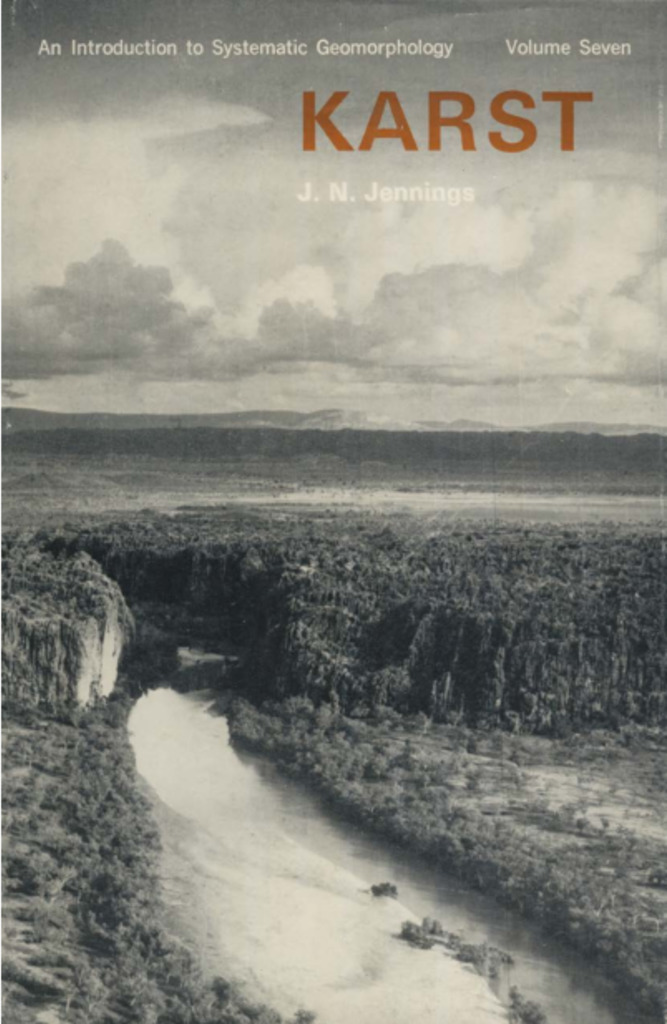
Karst »
Publication date: 1971
Rivers going underground, great springs emerging from the ground, independent hollows and basins instead of connecting valleys, deep potholes and vast caves, isolated towerlike hills reminiscent of the unbelievably steep peaks depicted in Chinese paintings - these are some of the distinctive features of karst, the name given to the kinds of country that owe their special characteristics to the unusual degree of solubility of their component rocks in natural waters. The special nature of karst is not only intrinsically interesting; it affects many aspects of life in the areas where it is found - water supplies, agriculture, engineering construction, tourism. There are, then, practical as well as scientific reasons for its study. The dramatic quality of karst landforms has caught the imagination of specialists and laymen alike. This book contains much to stimulate and inform the general reader as well as the undergraduate and high school student for whom it is written. It will be of particular interest to the hydrologist, the speleologist, and the sporting caver and potholer.
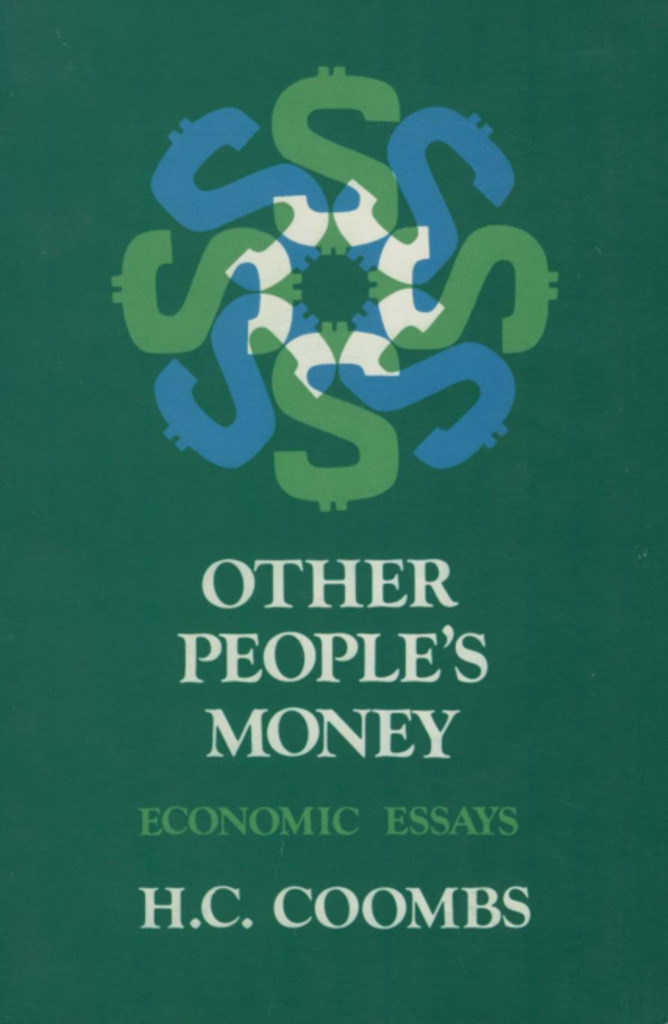
Other people's money: economic essays »
Publication date: 1971
These essays on the broad theme of monetary policy were written between 1949 and 1968 when the author was Governor of the Commonwealth Bank of Australia and later of the Reserve Bank of Australia. They record the changing patterns of thought in central banking policy during the time - a time of shifting emphasis in the theoretical concepts influencing economic analyses. To a large degree during that time it was necessary to rely on intuitive judgment about the factors at work within the economy As the author put it, 'we seem{u2026} to have always been forced to make the bricks of decision while struggling to gather the straw of understanding'. This book has both a contemporary and a historical value. Many of the problems discussed in it and with us still - inflation, the balance of payments, overseas investment - had their genesis in earlier events and are matters of signifcance to all concerned about the Australian economy today.
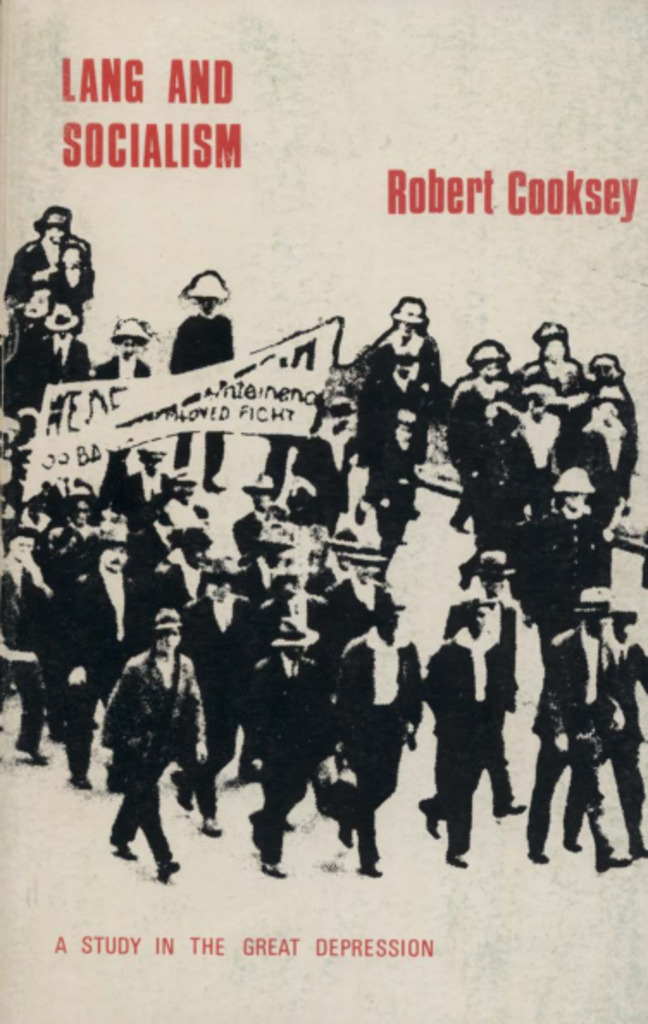
Lang and socialism: a study in the great depression »
Publication date: 1971
The Great Depression is a significant but neglected period in Australian history. This book describes the formation within the New South Wales Labor Party of a mass- organised ginger group, known as the Socialisation Units, which tried to convert the Party to 'socialism in our time'. The group became so strong that it was in effect a party within the Party. At the 1931 Easter Conference it succeeded in committing the Labor Party to a positive policy of socialism. Although the decision was later revised, it remains unique in the history of Australian Labor Parties. Throughout the period of the Socialisation Units, J.T. Lang presided over the New South Wales Labor Party as charismatic leader and machine boss. We read of his Inner Group's effort to contain the Units through Party management, of the defeat of the Socialisation Units after a struggle for power within the Party, and of the subsequent loss to the Labor Party of many young idealists who had been attracted by the Units. For those interested in Australian history and politics in the twentieth century this book will colour in a period so far only dimly sketched, and a political leader still seen as a hero or villain of the Great Depression.

Place and people: an ecology of a New Guinean community »
Publication date: 1971
The major purpose of this book is to describe the interaction between a place and its people. The people are a Maring-speaking clan cluster called the Bomagai-Angoiang, who number only 154 persons. Their place, or territory, is in such a remote part of the Bismarck Mountains of Australian New Guinea that the people{u2019}s first face-to-face contact with white men was delayed until 1958. Mr. Clarke{u2019}s focus is on the people{u2019}s subsistence behavior viewed ecologically. In what ways are their gardening activities controlled or limited by their physical environment? How effectively do the Bomagai-Angoiang, who have just emerged from the Stone Age, use the resources available to them? What are the crucial links between their social lives and beliefs and their relations with their habitat? In what ways has their completely noncommercial way of life brought about changes in their environment? Now that they have been attached to the western world, what changes will the future bring to the people and their isolated habitat? In order to demonstrate the interacting unity of place and people, Mr. Clarke combines the traditional subject matters of anthropology and geography, analyzing the Bomagai-Angoiang, their activities, and the elements of their physical environment as components of an ecosystem, whose structure and function he attempts to describe. He carries the "microstudy" approach to the level of the individual{u2019}s operations within the ecosystem, and also makes generalizations about the aggregate community. Many previous descriptions of place and people have emphasized either the controlling influence of place on people{u2019}s actions or, on the other hand, the ways in which inhabitants have affected their habitat. Mr. Clarke integrates these two different emphases within an ecological framework so that place and people - man and environment - are seen as parts of a single interacting system. His book differs from some studies of primitive or peasant communities in that, rather than being concerned with how the people{u2019}s lives might be more quickly enmeshed with the economy of the western world, he is interested mainly in judging the "health" of the local ecosystem - a judgment that is aided by the use of the concept of entropy content of systems.
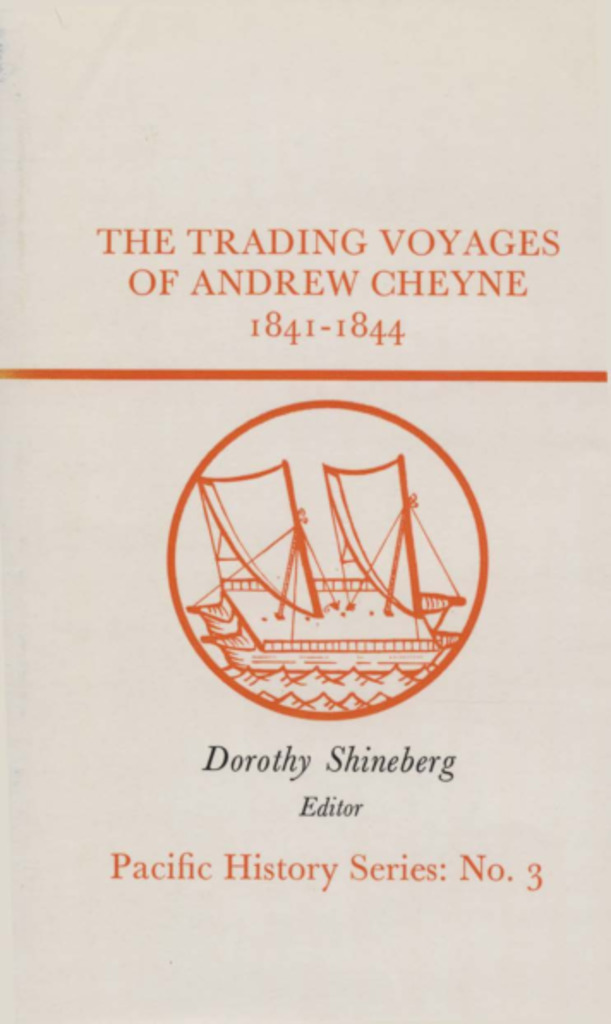
The trading voyages of Andrew Cheyne, 1841-1844 »
Publication date: 1971
This is the record o f one man{u2019}s voyages in the Western Pacific in the 1840s, told by himself. At an early age, Andrew Cheyne came from the Shetland Islands to seek his fortune in the Pacific area, and, being a competent and trustworthy young man, was soon engaged in a series of trading voyages for different ship owners. In the four voyages described he searched for sandalwood, beche-de-mer, and other tropical produce at the Isle of Pines, New Caledonia, the Loyalty Islands and the Solomons in Melanesia, and Ponape, Yap, and Palau in Micronesia. Relations between the islanders and the Europeans, and between Cheyne and rival traders, castaways, and deserters, were by no means always harmonious. Encounters with hostile natives who relished human flesh, and with belligerent white beachcombers, added danger to already hazardous voyages. Cheyne was shocked by the godless and abandoned way of life of the native peoples, but he was an accurate observer, and it would be hard to better his careful account of the places and peoples he encountered and the details of island trade. This is one of the earliest documents on the Western Pacific by a European, a very important source for Pacific historians and anthropologists, and an exciting book for all fascinated by the early adventurers of the Pacific.
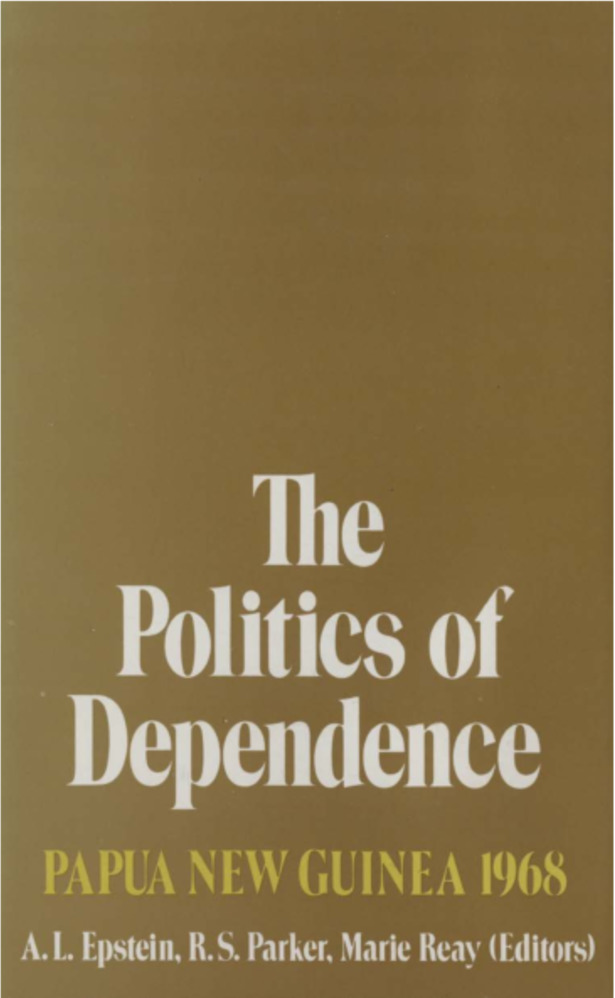
The politics of dependence: Papua New Guinea 1968 »
Publication date: 1971
This book is the record of a most unusual experiment: observations of politics at the grassroots during the second Papua New Guinea general elections by a team of distinguished anthropologists and political scientists. The outcome is a study of political change that enables a better understanding of political processes in emerging nations. It shows how the imported institutions of democratic elections and parliamentary government are perceived by the subsistence farmers and rural workers as well as evolues and expatriates, and how the emerging politicians and the colonial administration combine traditional loyalties and Western techniques as they seek to exploit these institutions. For policy makers and administrators, scholars and students, both of Papua New Guinea as it emerges into independence and of comparative politics of. other emergent nations, these studies raise issues of vital concern.

Asia and the Pacific in the 1970's: the roles of the United States, Australia and and New Zealand »
Publication date: 1971
The political character of the Asian and Pacific region is now being rudely shaken by the consequences of the Vietnam War. It is timely, therefore, to survey the present situation and the likely course of events in the region. Three broad themes emerge from this book: the fundamental change of mood in the United States and the likely consequences of a reduced American presence in Asia; the extent to which Japan is expected to dominate the region in the seventies; and the probable course of the ANZUS relationship itself. Three national viewpoints are reflected in the arguments of the contributors. The American view is preoccupied not only with the interests of the United States but with the shaping of events themselves. Australian and New Zealand concerns, however, are generally seen to be focused more specifically on the likely consequences of events on their own interests. If one concluding thought emerges, it is a pessimistic one. This is a time of revolutionary change throughout the world and especially in Asia. The world is less manageable than was once supposed. The crust of order, whether international or domestic, is dangerously thin. This is a survey of vital concern to all students of Asia, the Pacific, and the United States.
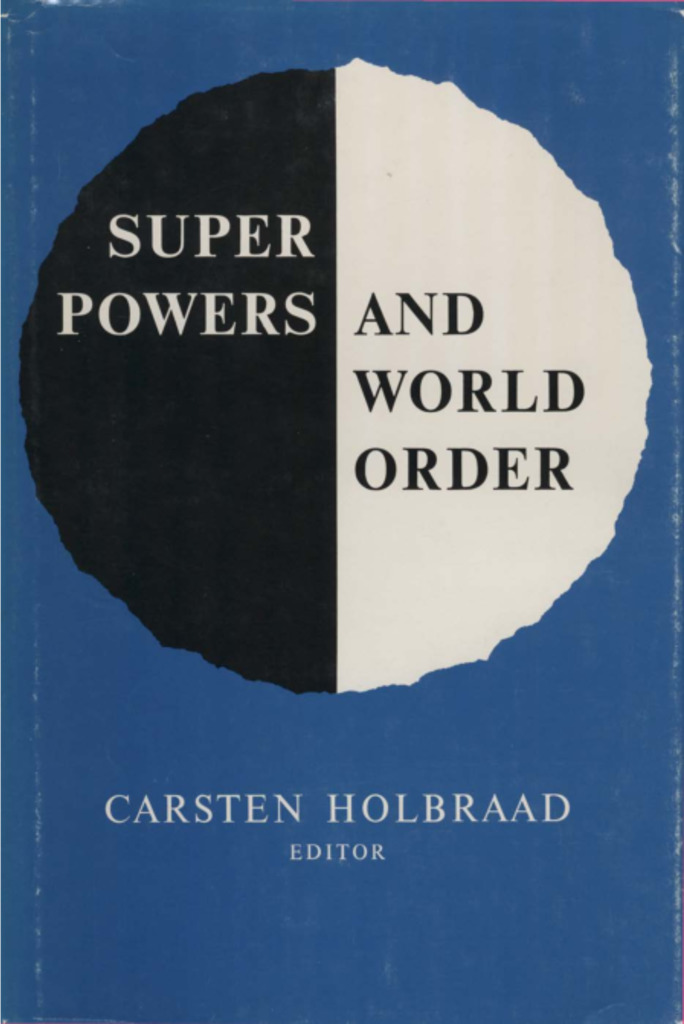
Super powers and world order »
Publication date: 1971
Will the future bring international anarchy or a more stable world order? Now that the Cold War has been replaced by something like a limited co-operation between the Western and the Eastern blocs, it is possible to take a more balanced view of great power relations. This book examines the prospects for the future of the balance of the two super powers - the United States and the Soviet Union - and the role that may be played by that great enigma, China, in the light of the recent history of relations between the powers. The United States and the Soviet Union seem to have reached an understanding in their relations, but the part that may be played by China is unpredictable. It is possible that she too may emerge as a super power, seeing her role as leader of the revolutionary forces in the underdeveloped countries throughout the world - the Third World which has also some influences on international affairs. This question, and many others of vital importance to the whole world, are examined in this book. Nine internationally known scholars contributed the essays in this volume, essays which form a valuable collection of thought and opinion on world affairs.
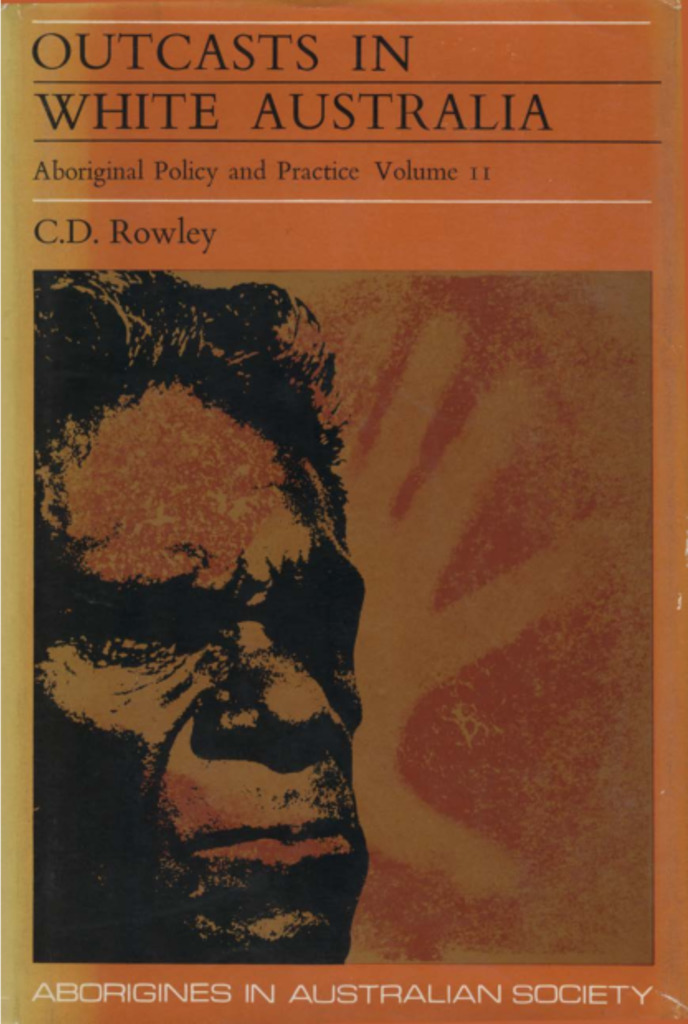
Outcasts in white Australia »
Publication date: 1971
The 'outcasts' of this book are those of Aboriginal descent, mainly the part-Aborigines, living on the fringes of country towns and in some of the big cities of Australia who, because of their appearance, have not 'passed' into white Australian society. They are the rejects, legislated out of the social, economic, and political life of the nation. The book should shame white Australians. It extensively documents the grim story of human injustice to which, deliberately or unwittingly, they have subjected the part- Aborigines. It raises the question of whether they are so racially prejudiced they do not even see the plight of these people, whose proper place, it appears, is on the degraded fringe, under-employed, ill-housed, ill-educated, scorned or ignored. Yet part-Aborigines are the most rapidly increasing segment of the Australian population. Are these new generations to live out their lives without justice or dignity? Or will white Australians, supporting policies of the kind proposed by Professor Rowley, open the way for justice, equality and human dignity; and provide new opportunities to share the rapidly increasing wealth of this country? This volume is the second in C.D. Rowley{u2019}s 3-volume study of 'Aboriginal Policy and Practice'. The first is The Destruction of Aboriginal Society; the third, The Remote Aborigines.
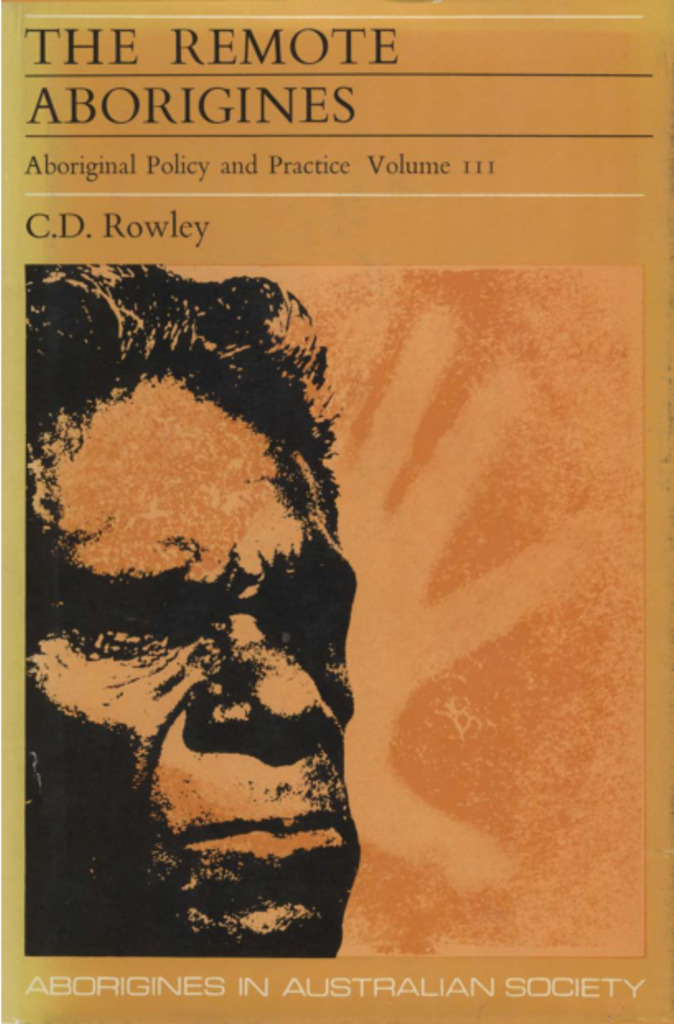
The remote Aborigines »
Publication date: 1971
This last book of Professor Rowley's trilogy on Aboriginal Policy and Practice deals with the situation of the 'full-blood' Aborigines in the centre and north of Australia. The author refers to this area as 'colonial Australia', offering reasons including the restrictions on movement by the Aborigines, with the resultant emphasis on mission and government 'settlements'; the much lower wages paid to Aborigines in the area; the withholding of social service benefits which other Australians may obtain easily; and the power vested in officials and missionaries to control Aborigines. Professor Rowley argues that, in the remote areas, policy and practice of government must be altered fundamentally, otherwise the last remnants of the tribes will be reduced to the situation described in Outcasts in White Australia. Like Rowley{u2019}s other two books, this one is an indictment of white Australian indifference to the maltreatment of an inarticulate minority. His basic argument is that no policy can now succeed without reconciliation; that governments, after two centuries, must come at last to negotiate with the Aborigines. It is also argued that even now it may not be too late to learn from the Aboriginal how to see and appreciate the continent in which we live. But this is an issue which demands some humility from non-Aboriginal Australians.



